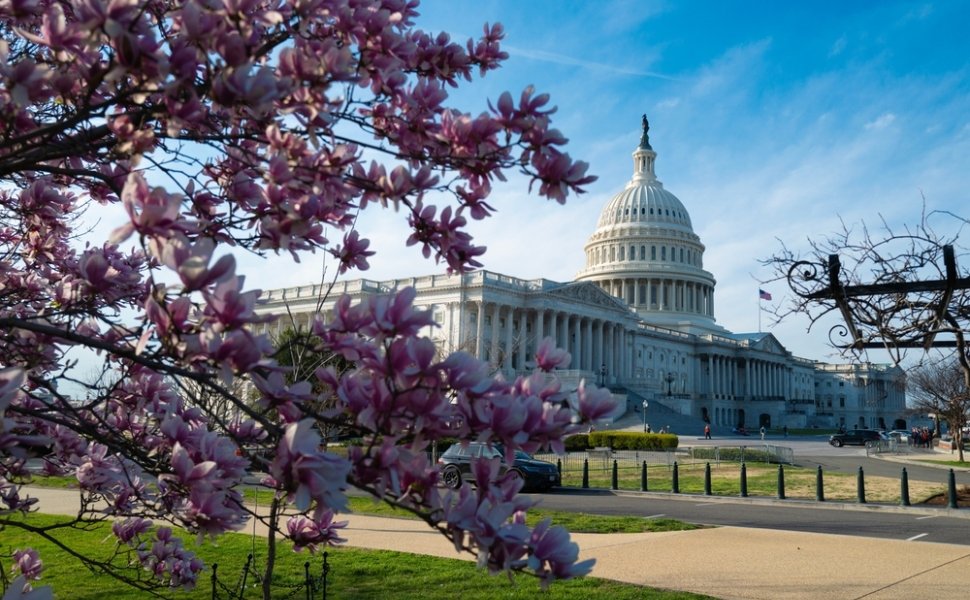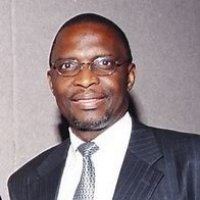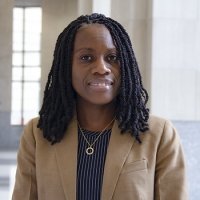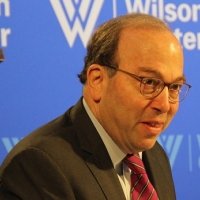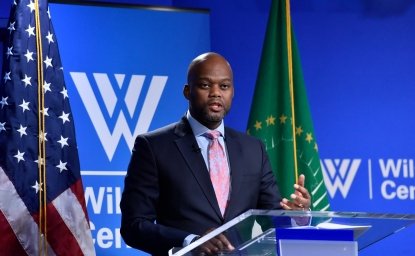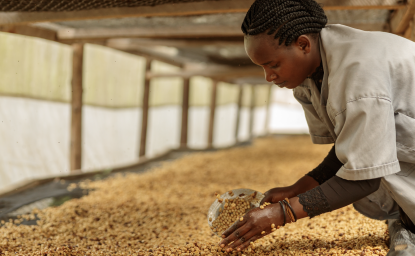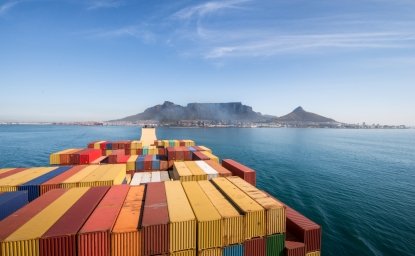This transcript has been lightly edited for length and clarity.
Oge Onubogu: [00:00:00] Welcome back to Beyond a Single Story, a Wilson Center Africa program podcast that explores diverse perspectives to better understand the U. S. 's evolving engagement with African countries. My name is Oge Onubogu and I'm joined today by my co host for this season, Witney Schneidman. Today we have a special episode featuring five guests.
Discussing what comes next for the African Growth and Opportunity Act and US Africa trade more broadly. We will hear from Florie Liser of the Corporate Council on Africa, Tom Sheehy at the US Institute of Peace, Zainab Usman of the Carnegie Endowment for International Peace, Fred Oladeinde of the AGOA CSO Network, and Ambassador Mark Green of the Wilson Center.
We're excited to have perspectives from these distinguished guests who have all been influential in [00:01:00] advancing U.S. Africa trade in their respective roles. Earlier this month, a new congressional session convened, and last month, the U.S. welcomed in a new administration. Despite bills having been introduced to reauthorize AGOA in both the Senate and House in the last Congress, neither advanced.
Before we turn to our guests, Witney, give us a sense of where we are with AGOA. With all these changes in Washington, D.C.
Witney Schneidman: Thanks, Oge. It's great to be with you again for this session of Beyond a Single Story. I think, um, AGOA is looking to find a place in, in this new Congress. There's been this, uh, flurry of executive orders and actions from President Trump and, um, AGOA has not been addressed.
Uh, as you mentioned, uh, uh, two bills were introduced, uh, in the last Congress, uh, one in the Senate, one in the House. Both of those will have to be reintroduced [00:02:00] in this new Congress. The good news is that those bills were very closely aligned. Um, Congressman James' bill, uh, advocated a 12 year extension.
Senators Risch and Senator Coons advocated a 16 year extension. So there's a lot of commonality. And I'm just, you know, hopeful that, um, the bipartisan consensus in Congress that has been so evident for so long when it comes to African issues will prevail. I mean, it's worth recalling that when AGOA was extended in 2015 for 10 years.
It passed the Senate by a vote of 99 to 1. I don't think we're going to see that again, but hopefully be a benefit of Republicans and Democrats who understand, uh, the importance of this legislation to the broader U. S. Africa trade relationship.
Oge Onubogu: Thanks, Witney. So let's now turn to our five guests who have [00:03:00] been following the conversation on what is next for US Africa trade. I think you lay out some really good questions that we will hopefully address in this episode as we listen to the thoughts that our guests share on this evolving U. S. Africa trade relationship. First, we'll hear from Florie Liser, who is the president and CEO of the Corporate Council on Africa and a longtime leader in US Africa trade. Then we will hear from Tom Sheehy, a distinguished fellow at the U. S. Institute of Peace. Tom worked on the U. S. House of Representatives Foreign Affairs Committee during the original passage of AGOA. Here's Florie.
Florie Liser: AGOA has been a successful In many ways, but, uh, its potential has not been fully lived up to. So extending AGOA now doing it as soon as possible for as long as [00:04:00] possible, at least 10 years, but 16 would be better is really important. This is an opportune moment for the United States to signal that Africa is a critical and strategic partner of the United States, not just for some of the reasons we hear about all the time, but because of the economic opportunities on the continent. And in terms of AGOA trade, there's really a lot that we could be doing in key strategic value chains and supply chains. And this is the right time to do it because of the African continental free trade area, which really will not only enhance intra African trade, but will provide a continental market for US businesses that want to trade with and invest in Africa.
Witney Schneidman: It's great to have Florie's perspective on, on the [00:05:00] podcast. Let's move on to Tom Sheehy before we discuss a few other points.
Tom Sheehy: It's essential that AGOA be passed as soon as possible. There's a lot of discussion about improving AGOA. You know, there's some criticism of AGOA. People say it hasn't quite. Achieved what, uh, people set out for to achieve 20 plus years ago. Sure. Uh, I was involved in, in the drafting of AGOA originally and it, and, uh, we probably would have hoped for.
Uh, Africa to be more than 2 percent of the world trade, uh, that stayed pretty constant. But we shouldn't lose sight of the fact that AGOA gives, uh, tariff free, quota free benefits to African economies. We can't do any better than that in terms of, uh, giving African access to the, to the U. S. market. So it, it's a, it's a fundamentally sound tool, uh, there are things we can certainly do to help African countries, uh, take better advantage of AGOA to develop export plans, help on infrastructure [00:06:00] development, but let's not criticize AGOA in of itself as being insufficient.
I think the eligibility criteria could be tweaked, but let's not lose sight of the fact that this has been a very successful piece of legislation. AGOA really provides maximum, uh, access to the US market. It's the things around AGOA that need to be done to, to see those African export numbers and, and U. S. investment numbers. Increase. It's the foundation of us, uh, Africa, economic relationships and let's not, uh, let the perfect be the enemy of good here.
Oge Onubogu: Let's pause here, Witney, and let's discuss a few of the points that Florie and Tom have shared so far.
You know, Witney, I just got back from Senegal and I know you're joining from Uganda and there's just so much happening on the continent, on the continent these days and just a lot of engagement, a lot of opportunity. I would love to hear your thoughts and reflections on some of these. [00:07:00] I
Witney Schneidman: I was in Kenya last week, and one of the data points I learned from Jas Bedi, who was on one of our podcasts, was that AGOA is responsible for the creation of some 56, 000 jobs in Kenya.
And I think that just underscores what both Florie and Tom were saying that AGOA is sound and it plays a very important role in the U S African relationship. I very much liked Florie's perspective of looking to the future, how AGOA can help the U S. uh, develop strategic value chains and supply chains.
Neither of those concepts were involved in AGOA when it was first passed 25 years ago, but it couldn't be more relevant today, as is working together with the African Continental Free Trade Agreement. As Florie underscored. So I think [00:08:00] both Tom and Florie sort of point to, um, we can do more, but we have to get AGOA renewed.
So we have this fundamental structure to build on.
Oge Onubogu: I think for me, just sitting in Senegal and remembering one of the. the conversations that we had with Vanessa Adams, where she spoke about the work that she had done back in the day on the West African trade hub, and how that work also helped inform or influence sort of the creation of Prosper Africa and some discussions that we see happening today.
I think going back to Tom's point of not losing sight of the fact that yes, AGOA may have some weaknesses, but it is, it has been a successful legislation. So there is quite a bit that, um, it has achieved and we should not lose sight of some of the positives, considering the fact that there are things that will need to be tweaked.
But I think just from the West African perspective and seeing the conversation now on trade [00:09:00] and the African continental free trade area and seeing how discussions on trade links with conversations on governance and development, I think there is a, there's a huge opportunity for the U. S. to get engaged and, and partner effectively with countries on, on trade and, and investment.
Witney Schneidman: And let me just make one more point since I'm in Uganda, as, as we're talking right now, Tom mentioned that some of the conditionalities could be tweaked. And as many of our listeners may be aware, uh, Uganda was, uh, denied. Uh, AGOA benefits after the, uh, anti LGBTQ plus legislation passed through Parliament.
I think this raises the question of, can we make AGOA and the conditionalities more targeted for those who make decisions? That go against American values as opposed to holding a whole nation, uh, accountable for the [00:10:00] actions of others. I think we really have to get more into that kind of specificity, uh, to ensure that AGOA, uh, continues to, uh, not only achieve its goals, but the US stays engaged with the very people. that we want to be, uh, working with.
Oge Onubogu: Mm hmm. Very, very important point. So, great. Let's, let's get back to our speakers now. We have a little more to hear from Tom, and then we will hear from Zainab Usman, who is the Africa Director of the Carnegie Endowment for International Peace.
So, let's get back to Tom Sheehy.
Tom Sheehy: Passing AGOA is essential to, uh, U. S. competitiveness in Africa. There's a lot of discussion about competing with China. Everyone knows China has emerged as a major economic power on the continent, but it's not just China. Uh, countries all over the world are discovering the importance of, of Africa for critical minerals, for other, other economic, uh, [00:11:00] reasons, building infrastructure.
It would really be a grave misfortune for the U. S. to step away from Africa economically at this very time that, uh, the whole world is discovering Africa. Uh, the fact that Africa is now integrating, we have the Africa continental free trade area. Uh, this is a new, exciting development. Sure. There's, there's a lot to, a lot to be done.
It's really just starting up, but, uh, it would really be ironic and very, uh, tragic if the United States at the very time that, uh, Africa is moving to integrate their economies, uh, takes away this, this benefit. And, uh, disincentivizes U. S. companies from investing and being part of that, uh, continental economic integration.
Oge Onubogu: Now let's hear from Zainab Usman.
Zainab Usman: There's no other [00:12:00] advanced economy or global power that has a preferential trade program like AGOA with Africa. China recently announced that it would eliminate tariffs across a number of product lines for All these developed countries to allow and to enable these countries, same thing to increase and diversify their exports, uh, by having access to the Chinese market, but this is still not AGOA.
It's very different. And one could even argue that maybe China took inspiration from AGOA in the U. S. I say all of this to emphasize that AGOA is truly unique. Having said that, in this new geopolitical environment, given that there are now different priorities for global trade relations and international economic relations, I do think that a program like [00:13:00] AGOA can be reimagined to better adapt to this new geopolitical reality.
And on that front, I think AGOA, uh, can be seen, can be repurposed as a program benefits Africa, but also benefits the U S whereas in its current, uh, form, it is almost like a one way, um, initiative that is just meant to help Africa. But the U S too can benefit from AGOA. Uh, and maybe this needs to be made a little bit more explicit one area where I think AGOA could be better leveraged is to think of repurposing the tool to help the U. S. also secure supplies of critical materials. So critical minerals, for example, that are in abundance in Africa. So if you look at the list of critical minerals, at least 10 out of these 50, the U. S. is between 50 to [00:14:00] 100 percent import reliant. And the imports mostly come from China.
China is now regarded as a competitor or even as an adversary in certain domains to the US. It's actually a national security priority to reduce dependence on China, but China is a major exporter of these minerals, whether it's rare earths or processed graphite or cobalt, lithium, et cetera. So the, for the U S to diversify the sources of its supplies, Africa might probably be an important part of that solution.
And therefore, AGOA could be a tool that could be repurposed on that front.
Oge Onubogu: Both Zainab and Tom have both talked about U. S. competitiveness around critical minerals and specifically referenced competition with China. Florie also mentioned the U. S. strategic economic interest [00:15:00] in Africa. I think in this era of accelerating great power competition, AGOA Has never been more important to the U.S. strategic interest as it is, uh, today. So Witney, can you help us unpack this a little bit more between this great power competition and the importance of AGOA?
Witney Schneidman: I think China has been quite strategic over the last 20 years in terms of Um, gaining access to those countries and those natural resources, uh, that are endowed with critical minerals.
Ten of the 50 critical minerals, uh, come from Africa and most of those minerals are being processed in China. So the U. S. has to wake up and get much more, uh, aggressive to engage in the strategic supply chain in such a way that It creates value [00:16:00] in Africa, creates value in the DRC, creates value in Zambia, Angola, Tanzania, where many of these minerals are located.
And can have, um, direct access. I remember when we were talking with Rosa Whitaker, one of the ideas she has put forward, uh, was the notion of investment incentives. And I think that would be one way to reimagine, uh, AGOAas, uh, XIP suggested where you provide incentives for US companies to invest in certain strategic sectors.
And we saw the US do this in the inflation reduction Act. And I think, uh, that's a great model that can be utilized for AGOAto really, you know, boost us competitiveness. Oge, one of the conversations I had last week in Kenya, uh, the point was made that if the U. S. does not renew AGOA, it will be the only, not just major [00:17:00] power, but major middle power that does not have a formal trade relationship.
with Africa. And I don't think we want to be in that position, just given the dynamism of the continent today and tomorrow.
Oge Onubogu: You've definitely raised an important point. And I think while the conversations and sort of the, the thoughts that we've had from our guests have mentioned China, I think we should also realize that it's not just China that is in the picture.
There are other emerging, um, actors too, as well, emerging powers that are engaging with African countries. And this came out clearly in some of the conversations that I was having last week with, um, partners and colleagues from across West Africa in Senegal. I think it is clear that with the fast growing population on the continent, the vast amount of natural resources, as have been referenced by our guest and also with the African continental free trade area, [00:18:00] This really presents the largest free trade area in the world.
Africa has a unique and dynamic economic landscape with immense potential for private sector investment and AGOA presents a tool that the U. S. could use in this environment. So, with that, let us hear from our next guest.
Witney Schneidman: Next we will hear from Fred Oladende. Fred is, uh, is the chairman of the AGOA Civil Society Organizations Network and president of the Foundation for Democracy, uh, in Africa, and I have to add, a tireless advocate for AGOA and AGOA's renewal.
Fred Oladeinde: You know, one of the key things will be to integrate more of the ongoing Africa continental free trade, [00:19:00] uh, uh, benefits that would empower, uh, those, Investors, particularly diaspora investors, that will be able to catalyze U. S. investment across Africa and help with creating those critical, badly needed jobs in select sectors.
These sectors, as we all know, would include those that would Strengthen the supply chain, uh, not only intra Africa, but also ensure that countries that have comparative advantage in terms of production, in terms of quality, in terms of pricing, can take advantage of the U. S. market. It must also show the commitment of the Supply side.
And in this case, I'm referring to AGOA eligible [00:20:00] countries to ensure that they put in place their country AGOA strategic plans, and that those strategic plans reflect those select sectors that they could really use to create jobs and get Quality products into the United States market.
Witney Schneidman: I can just pick up on one of Fred's comments there about the importance of an AGOA strategic plan, because I think what we've seen is that those countries that have in fact implemented, uh, strategic plans. Their utilization rate has increased anywhere from 80% to as much as 3000%. This was, uh, a feature when AGOA was renewed in 2015.
Uh, Congress, uh, urged all Africa, all AGOA beneficiaries to develop these plans. Uh, but I noted when the, uh, AGOA ministerial was held in [00:21:00] Washington last July, the African trade ministers committed themselves to developing these strategic plans. So I think that's an important development because I see an overlap with the, with the uh, guided trade facility of the AFCFTA, which also works with governments to develop strategies for promoting inter-regional trade, so if a trade ministry is working to, uh, understand its comparative advantage to the U. S., it's not a big step to work on its comparative advantage to its neighbor and through the region.
Oge Onubogu: And I think, you know, also to pick up on a point that Fred made about jobs on the continent.
And when we look at just the demographic, uh, boom on the continent, you know, with over, I think it's about 1. 2 or 1. 3 billion. Uh, currently in terms of population size, size on the continent, and [00:22:00] this number is expected to double within the next 20 to 25 years. So you're looking at a region where significant jobs are needed.
And African governments, the AU is doing quite a bit to see how they can do some work with the African continental free trade area to really integrate African markets. So the, the potential there. is huge. The potential to be able to develop, uh, new companies in be it in the auto sector or agriculture or information and technology or critical minerals, as was mentioned by our guest, there are a lot of opportunities there.
And AGOA could present a promising tool. It's not perfect, but it could present a promising tool. to engage in this space. If we do not, um, engage in this space at the end of the day, it's really, um, sort of the African, African businesses, the African population, the young growing [00:23:00] population and American businesses that could have invested in this space that could end up losing.
So there is, there is potential here. There is opportunity. And there is a tool, as I said, the tool may not be great, but it is a promising tool that we could use to engage in, in this space. Okay, great. So let's move on to our last perspective, which comes from the leadership of the Wilson Center, Ambassador Mark Green.
Ambassador Green is the president and CEO of the Wilson Center. We're very excited to have his perspective on this. Wilson Center Africa Program podcast. Prior to leading the Wilson Center, Ambassador Green served as administrator for USAID, and before that he served as the president of the International Republican Institute, IRI.
He was also ambassador to Tanzania from 2007 to 2009 and served four terms in the [00:24:00] U. S. House of Representatives. Here is Ambassador Green.
Ambassador Mark Green: From the U. S. perspective, I think we have to be clear on what. We see success being, and that's something I think that has been quite frankly missing in, uh, in recent years. What is it that we hope to see? What does success look like? Secondly, what we need to do is to help African leaders foster their own trade markets.
And they, obviously, the continued development of the continent wide free trade area is vitally important because it creates a critical mass in markets and products. And I think the next piece to it is we need to see a development of tools back here that operate more nimbly, uh, more quickly, more flexibly than what we've seen to date.
We oftentimes hear [00:25:00] that by the time businesses get a response back from the federal government and ways that the federal government can be helpful, it's too late. And the deal's over and that somebody else has stepped into that space. So I think it's really important we define success. I think it's really important that we foster the tools to help both sides get there.
And then I think finally, um, perhaps most importantly, when we look at Africa, we have to remember this is the youngest continent in the world. There are millions and millions of young people, aspirational, idealistic. Uh, developing disposable income with big dreams and big ideas. Tap into that, harness that.
That's how you make a difference.
Oge Onubogu: So Witney, I, I really liked Ambassador Green's question. What is it that we hope to see going forward? We heard from Tom and Florie at the very beginning and [00:26:00] also recall the conversation that we had with Rosa Whittaker in episode two. that originally they had hoped AGOA would have led to greater trade volumes.
But what about now going forward? What do we see as, uh, what do we hope to see? What opportunities, um, exist now to move this forward, uh, to move the conversation forward, I think has, has already been mentioned and to some extent implied by all our different guests in the, in the episodes that we've had thus far.
AGOA may not be a perfect tool, but it is a promising tool. So what do we hope to see in the future with AGOA?
Witney Schneidman: Oge, I want to just pick up on Ambassador Green's comment about harnessing the aspiration of Africans, Africa's youth. Because I think that's so critical as you said, uh, Africa's population is going to double in 25 years [00:27:00] and the median age is 19.
So there's this incredible youth population that is really aspiring to determine the future of the continent. And I think one aspect to that is the whole digital infrastructure. I know there are a number of U. S. companies on the continent working in this space, Google, Microsoft, others, um, the whole role of AI, we have to be having this conversation here. Um, Africa cannot be left out of that conversation. So I think that is one aspect that we have to take in consideration. How do we really unlock the digital opportunity that leads to job creation and enhance trade between Africa and the United States.
Oge Onubogu: Very important points that you, you raise Witney.
And I think going back to one of the points that Ambassador Green had made about the U. S. developing more nimble. tools to be able to partner with African countries to be [00:28:00] able to achieve their aspirations. I think that is an important point. And, you know, just having conversations on, on the continent, as we look to the future of what comes next, perhaps conversations on, on AGOA.
Or just the time it has taken to sort of process the discussions around reauthorization of AGOA may not be sending the best signal to our African partners, may not be painting the right picture about the importance of the relationship. or the importance of the relationship that the United States would like to have with African countries.
And I think going back to the point, um, great power competition or strategic competition by Tom and Zainab and Florie in their remarks, um, we have to be clear about the message that we are sending to our African [00:29:00] partners. So I think in terms of opportunities moving forward, Um, considering the fact that AGOA is set to expire in September of this year, I think we, we need to ask ourselves a serious question, an important question of what type of message should we be sending now, or what type of message could be sent now, especially with a new administration, especially with new individuals in the space who are thinking about US Africa trade relations. What message should we be sending now to our African partners? What actions could we take now to show our African partners that this relationship, U. S. Africa trade relationship is a priority. And this may not only be a message that could be sent to our African partners, but also it's shows a message to those who are also engaging in this space, be them China, Russia, India, Turkey, and the other [00:30:00] actors too as well, that the US is serious about this relationship, about its trade relationship with the African continent.
Witney Schneidman: Oge, you're absolutely spot on here. What I hear you saying is that we have to approach AGOA's renewal with a sense of urgency because if it's allowed to expire on September 30th, 2025, as it's set to do now, and AGOA's renewed for an extended time, you know, the US will be losing out in the African market at a time when it's becoming more and more dynamic. One of the initiatives that I'm hopeful that will continue is a libido corridor initiative. Which is where the U. S. and the E. U. and the African Development Bank and African Finance Corporation and development banks in the region have come together to not only rehabilitate the rail line from Benguela to the DRC into [00:31:00] Zambia, but to work with communities along that rail line to enhance agricultural productivity, to enhance digital skilling, to enhance education and health.
And I think that's exactly the kind of approach that we need. Uh, to be seeing and hopefully that continues and takes on a bipartisan and not just a support, but active implementation. And it, I think the U. S. is at a bit of a pivot point here with the new administration. We're waiting to see. What their priorities for Africa become, but in many respects, the tools are there.
We just have to utilize them, utilize them better and make sure, as you say, that we're sending the right signal to our partners on the continent. I would be hopeful that we would go back to free trade agreements. That's something that the previous Trump administration initiated with Kenya. Uh, the Biden administration [00:32:00] sought to get a strategic trading and investment partnership with Kenya.
Neither of those reached conclusion, but the time is now not only to renew AGOA, but to build on AGOA, to modernize AGOA, you know. Oge, I just want to pick up on one other theme and one last theme that, uh, Fred mentioned, and that is a diaspora. I was interested, I saw today that the World Bank is working with Kenya to establish a diaspora bond.
I think this kind of creative thinking is so important because Kenya, like many African countries, gets more foreign exchange from their diaspora communities than they do from investment. So to establish these bonds. That are generating revenue that help governments prioritize where they want to see their development objectives.
This could resonate very positively to to diaspora businesses as they can [00:33:00] consider working in the African market. And here again, AGOA provides a very valuable context in which for that, in which diaspora. Businesses can operate.
Oge Onubogu: I'm really glad you picked up on that point, a very important and crucial points on, on the diaspora.
In fact, no other country has the vibrant African diaspora than what we have here, um, in the US so it's definitely one that should be harnessed not only with the Kenyan example that you've shared, but several other countries on the continent. So, ensuring that we work with the African diaspora and engage them in conversations to really inform how the US does business in and with Africa.
Witney Schneidman: In going back over some of the past episodes, I was really struck by Ndidi Okonkwo's comments. Ndidi, I think as our listeners know, is president and CEO of the One [00:34:00] Campaign. And, uh, she made this point that AGOA is not about, is not just about trade. It's about empowering growth and unlocking trust and deepening the opportunity to realize the full potential of the US and Africa partnership. And I think those three notions of growth, trust. And partnership really is at the core of what we're trying to achieve at the core of the, of the future relationship that we want to have with our partners on the continent.
Oge Onubogu: I think she had in that episode, she advocated for an AGOA framework, if we recall, that's what she, she mentioned with specific targets that has knowledge transfer mechanisms and also is able to create catalytic, catalytic financing to support growth and ensuring that civil society actors, I loved the way she described civil society beyond [00:35:00] just organizations, but civil society is made up of. Private sector, labor unions, trade unions, different actors in the entire civil society ecosystem, ensuring that their voices are engaged in helping to shape a roadmap for AGOA, AGOA's implementation in Africa.
Witney Schneidman: And she made a further point that civil society needs to be at the table to unlock this potential. And, you know, that was one of the themes that came through so clearly last week when I was in Nairobi, at Strathmore University, teaching an AGOA boot camp. The youth want to be involved. They want their voices heard.
And it's essential that government takes into consideration what is the concern of the youth. Because youth today is going to be a huge force, and that needs to be reflected in, in the trade relationships that we're working to forward.
Oge Onubogu: Witney, I think it's wonderful that we're [00:36:00] recording this episode while you're in Uganda and you were just in Kenya as well.
And I'm just back from Senegal. And I think this message about youth and just the vibrancy and where we see things on the continent, it's, it's really amazing that the message resonates. It's the same from West to East Africa. Young people want to have their voices heard. Uh, there's an aspiration for more growth and engagement and development.
There's room for more, uh, job creation on the continent. Just the vibrancy of the information technology sector. Um, the discussions that are happening across the board. And the fact that just as you observed in East Africa, and as I observed in West Africa, There are, this is an era of strategic competition, and it's not only China that is coming into this space for conversation.
There is [00:37:00] India, there's Turkey, there's Iran, there are others in this space. And so, the U. S. In many ways, also has to step up and use the tools that it has existing, such as AGOA, that may not be perfect, but is promising. Use these tools to figure out the best way, how best we engage with our African partners.
Thank you for joining us for this episode of Beyond a Single Story. As always, a special thanks to the production team that made this series possible. This episode was produced by Aaron Stanley and Nathaniel Oakes, technical assistance was provided by Sharona Harris, and editing was done by Brian Prevost.
The views expressed by guests of the podcast are their own and do not necessarily represent the views of the Wilson Center Africa program. The Africa program is part of the Wilson Center, a congressionally chartered think tank that provides insights on global affairs to policymakers [00:38:00] and the public through deep research, impartial analysis, and independent scholarship.
